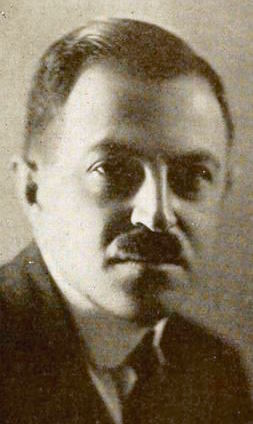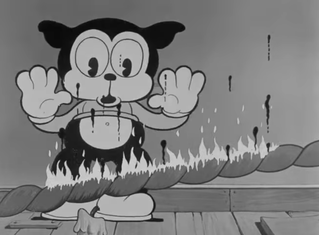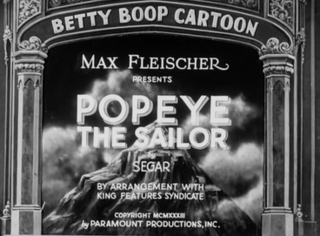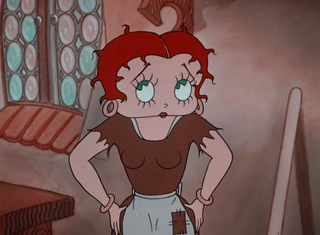Related Research Articles

Snow-White is a 1933 American animated short in the Betty Boop series from Max Fleischer's Fleischer Studios. Dave Fleischer was credited as director, although virtually all the animation was done by Roland Crandall, who received the opportunity to make Snow-White on his own as a reward for his several years of devotion to the Fleischer studio. The resulting film, which took six months to complete, is considered both Crandall's masterwork and an important milestone of the Golden age of American animation.

Fleischer Studios was an American animation studio founded in 1929 by brothers Max and Dave Fleischer, who ran the pioneering company from its inception until its acquisition by Paramount Pictures, the parent company and the distributor of its films. In its prime, Fleischer Studios was a premier producer of animated cartoons for theaters, with Walt Disney Productions being its chief competitor in the 1930s.

Max Fleischer was a Polish-American animator and studio owner. Born in Kraków, Poland, Fleischer immigrated to the United States where he became a pioneer in the development of the animated cartoon and served as the head of Fleischer Studios, which he co-founded with his younger brother Dave. He brought such comic characters as Koko the Clown, Betty Boop, Popeye, and Superman to the movie screen, and was responsible for several technological innovations, including the rotoscope, the "follow the bouncing ball" technique pioneered in the Ko-Ko Song Car-Tunes films, and the "stereoptical process". Film director Richard Fleischer was his son.

Betty Boop is an animated cartoon character designed by Grim Natwick at the request of Dave Fleischer. She originally appeared in the Talkartoon and Betty Boop film series, which were produced by Fleischer Studios and released by Paramount Pictures. She was featured in 90 theatrical cartoons between 1930 and 1939. She has also been featured in comic strips and mass merchandising.

Mae Questel was an American actress. She was best known for providing the voices for the animated characters Betty Boop, Olive Oyl and numerous others.

Myron "Grim" Natwick was an American artist, animator, and film director. Natwick is best known for drawing the Fleischer Studios' most popular character, Betty Boop.

Bimbo is a fat, black and white cartoon pup created by Fleischer Studios. He is most well known for his role in the Betty Boop cartoon series, where he featured as Betty's main love interest. A precursor design of Bimbo, originally named Fitz, first appeared in the Out of the Inkwell series.

The Old Man of the Mountain is a 1933 American pre-Code live-action/animated short in the Betty Boop series, produced by Fleischer Studios. Featuring music by Cab Calloway and his Orchestra, the short was originally released to theaters on August 4, 1933, by Paramount Pictures. Calloway voices all of the characters in the cartoon save for Betty herself. Calloway and his orchestra also perform all of the music in the cartoon, including two songs Calloway co-wrote.

Popeye the Sailor is a 1933 animated short produced by Fleischer Studios and distributed by Paramount Publix Corporation. While billed as a Betty Boop cartoon, it was produced as a vehicle for Popeye in his debut animated appearance.
Chess-Nuts is a 1932 Fleischer Studios animated short film starring Betty Boop, and featuring Bimbo and Koko the Clown.
Betty Boop's Ker-Choo is a 1932 Fleischer Studios animated short film starring Betty Boop, and featuring Koko the Clown and Bimbo.
I Heard is a 1933 Pre-Code Fleischer Studios animated short film starring Betty Boop, and featuring Koko the Clown and Bimbo. The cartoon features music by and a special guest appearance from jazz musician Don Redman and his Orchestra.

Poor Cinderella is a 1934 Fleischer Studios-animated short film featuring Betty Boop. Poor Cinderella was Fleischer Studios' first color film, and the only appearance of Betty Boop in color during the Fleischer era. It was the first Paramount Pictures animated short in color.
Baby Be Good is a 1935 Fleischer Studios animated short film starring Betty Boop.
Betty Boop's Birthday Party is a 1933 Fleischer Studio animated short film, starring Betty Boop and featuring Koko the Clown and Bimbo.
Willard Gustav Bowsky was an American animator best known for his work at Fleischer Studios in New York City and Miami, Florida, where he worked on cartoons featuring Betty Boop, Popeye the Sailor, and Superman, in addition to two feature-length animated films. Fellow Fleischer animator Shamus Culhane described Bowsky as "what one might call a pre-McCarthy, gung ho, all-American Babbitt." He was described as being outspoken with anti-Semitic remarks, but skilled at animating complicated perspective shots and directing many of the jazz-influenced cartoons produced by the studio.

Old King Cole is a Disney cartoon in the Silly Symphonies series, based on several nursery rhymes and fairy tales, including "Old King Cole". It was directed by David Hand and released on July 29, 1933.
Clara Rothbart known professionally as Bonnie Poe was an American actress, best known for providing the voice for the Fleischer Studios animated character Betty Boop beginning in 1933, starting with the Popeye the Sailor series and featuring in a dozen cartoons. She voiced her in a live-action segment on the special Hollywood on Parade No. A-8, performing a skit with Bela Lugosi providing a portrayal of Count Dracula.
The Foxy Hunter is a 1937 Fleischer Studios animated short film starring Betty Boop, her nephew Junior and Pudgy the Puppy. All three characters are voiced by Mae Questel.
Jack and the Beanstalk is a 1931 Fleischer Studios Talkartoon animated short film starring Bimbo and Betty Boop.
References
- ↑ Scott, Keith (2022). Cartoon Voices from the Golden Age, 1930-70. BearManor Media. p. 334. ISBN 979-8-88771-010-5.
- ↑ Lenburg, Jeff (1999). The Encyclopedia of Animated Cartoons. Checkmark Books. pp. 54–56. ISBN 0-8160-3831-7 . Retrieved 6 June 2020.